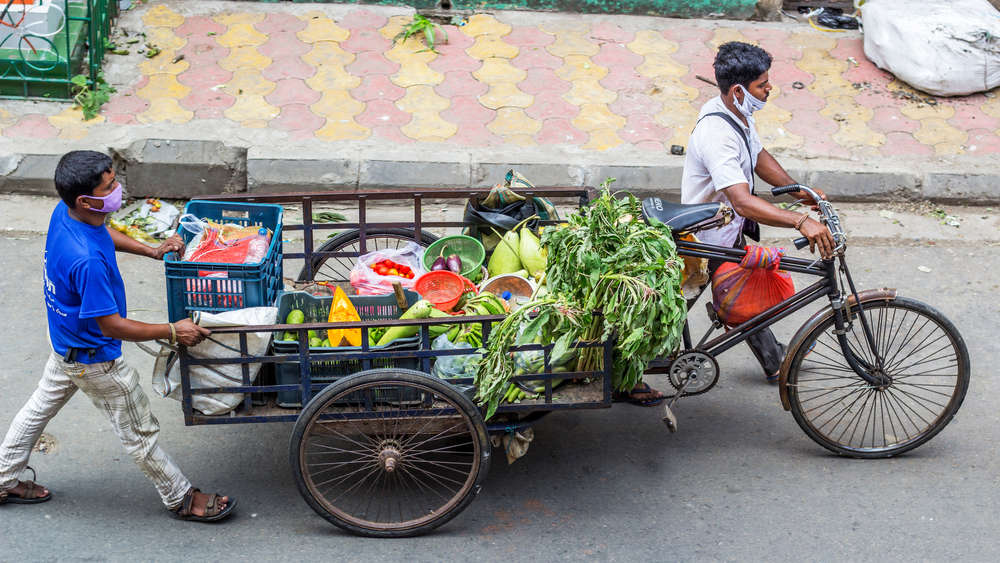The chorus of vendors weaving their way through the streets of Calcutta has impacted auditory nerves for centuries, a trend well documented since the mid-19th century, in lithographs and etchings by artists like Balthazar Solvyns and Abanindranath Tagore. It also finds mention in sundry books.
While our generation grew up to welcome sounds of the ice-cream cart (Kwality, Magnolia and Farini), the more rustic ghoti garam or the ‘cake man’ with a trunk on his head selling gaudy pastries and bakarkhani, the tribe of these alley vendors multiplied over the years, their entrepreneurship matching their ability to customize their wares to the changing needs of buyers. In May, the Zurich Museum hosted a virtual exhibition of these soundscapes recorded by two Swiss tourists, the diurnal cacophony of hawker and traffic sounds offset by Calcutta’s nocturnal serenity.
Prior to our Covid-19 routine, most vendor calls went unheeded, primarily because daytime sounds took precedence and the demand for their wares or expertise was not all-consuming. Once the lockdown was clamped, these vendors became conspicuous by their absence. Housebound residents began to crave the arrival of the cobbler or the locksmith, or the man who chisels the grindstone. Their unique calls, sometimes indecipherable, were missed.
When the “unlocking” phase began at the end of May, a different array of hawkers trooped in. Those selling vegetables, fish and fruit brought the market to the doorstep. Enterprising rickshaw-pullers peddled their wares door to door, their metamorphosis filling a need of the residents as well as their pockets.
Even during ‘Unlock 4’, the fishmonger’s cry continues to be the first in our lane every morning: jyanto maach (live fish), he cries, the voice muffled by the customary face mask. He rattles off the variety on offer in the huge handi precariously perched on his bicycle: rui, katla, koi, tangra, chingri, pabda... sometimes even the hilsa and mourala. He is followed by the vendor selling bread and milk.
The hawker seeking old newspapers had disappeared for a while, just as the printed dailies did in the initial stages of lockdown, but has resurfaced. There is no difficulty in deciphering his call; he does not wear a mask. There is also a man who will accept anything old and non-functional. His list is diverse — harmonium, watch, laptop, inverter, air-conditioner, washing machine — yet he rarely finds any custom.
The mattress-maker’s “tasak-balish” intonations make it well-nigh impossible to guess his identity. In his wake, the vegetable vendor is accompanied by his wife, whose lung-power belies her diminutive frame. “Sobji nebe go?” she calls out, loud and clear. The fruit vendor too, mask under his chin but gloves in place, is audible well before he comes into view. He used to be a bus conductor in his pre-pandemic heyday, so the vocal cords are well exercised!
Most of these hawkers, a godsend in the Covid-19 environment, have switched professions to survive. Many lost their jobs and opted for the vending route, masks and sanitizers offering good returns. In their desperation to earn a living, those who used to travel by local train now arrive in vans ferrying vegetables.
We have grown accustomed to this ‘new normal’. Every time the state government announces random ‘total lockdown’ days, we suffer in unison: these vendors are deprived of their earnings and the residents of fresh doorstep supplies and domestic help.
Unlike the strict lockdown in Odisha, Tamil Nadu, Karnataka, Uttar Pradesh and even Arunachal Pradesh, have these stray lockdown days in Bengal, in spite of the Centre’s September notification to the contrary, served any purpose? They have certainly not ‘broken the chain’ of virus spread as intended. Can anyone please proffer the benefits of today’s lockdown or the one initially scheduled for tomorrow but scrapped at the last minute? Is there any method in the selection of dates, considering they are altered at will? Surely we have a right to know.










